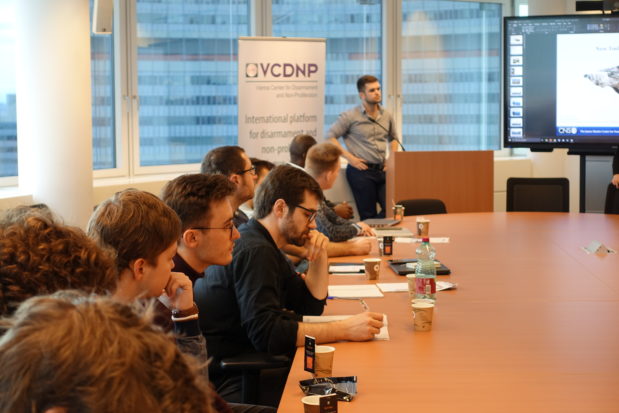On 19-21 February 2020, the VCDNP held the first course on nuclear non-proliferation for graduate and post-graduate students in the fields of IT and engineering, titled “The Spread of Nuclear Weapons: History, Threats and Solutions”. The course represented a joint project between the VCDNP and the EU Non-Proliferation and Disarmament Consortium (EUNPDC), of which the VCDNP is one of six leading non-governmental organizations. The course brought together 26 participants from nine European universities in nine countries.
The three-day course was designed to provide an introduction to nuclear non-proliferation and disarmament issues to students of technical subjects. The program covered a broad range of topics, from the fundamentals of the nuclear fuel cycle and the history of the spread of nuclear weapons, to export controls and the challenges and opportunities presented by advanced and emerging technologies.
The students learned about different elements of the international non-proliferation regime, including the Treaty on the Non-Proliferation of Nuclear Weapons, the International Atomic Energy Agency (IAEA) and its safeguards, and the Comprehensive Nuclear-Test-Ban Treaty Organization (CTBTO) and the verification system it establishes. Course participants also received an overview of how open source information and tools, including satellite imagery and image analysis software, can be used to monitor nuclear and missile programs such as that of North Korea.
The lecturers at the course included experts from the VCDNP, the James Martin Center for Nonproliferation Studies, IAEA, CTBTO, Stockholm International Peace Research Institute, King’s College London and Austrian Red Cross.
At the end of the course, participants completed an anonymous evaluation, providing feedback on the program and suggestions for improvement. The participants highlighted the usefulness of the course and stressed their appreciation for the level of expertise of the speakers. A selection of comments is posted below (quoted as written):
I was not aware of the vast multiplicity of efforts, organizations and collaborations allied to supervise and control nuclear safety, security, and non-proliferation. As a result of this course I will consider the possibility to lean more on the subject with the intent to work in the field of nuclear safety in the future.
Beside the practical effects of nuclear weapons, covering political and strategic issues both in the development and use of nuclear weapons is, I believe, extremely useful for technical students to understand aspects not covered in our training.
Coming from a “technical” world with a very little insight of the topic it really helped me to understand much more a not usually studied topic.
Coming from zero knowledge background in terms of non-proliferation and disarmament it was definitely a 10/10.
The course was funded by the European Union through the EUNPDC pursuant to the EU Council Decision 2018/299.

